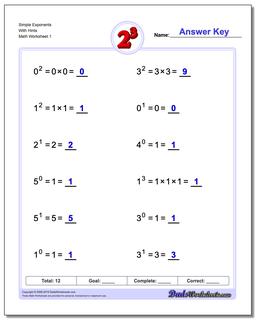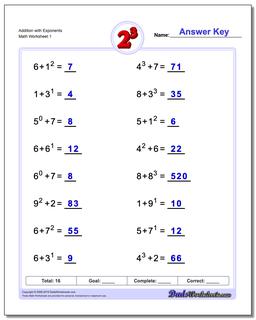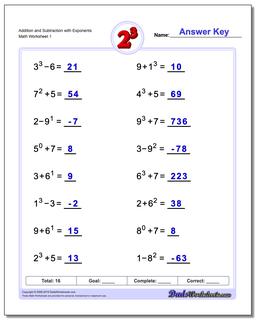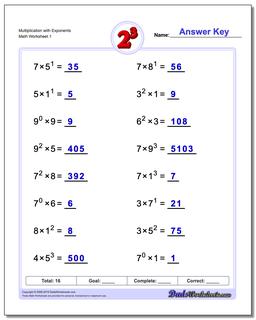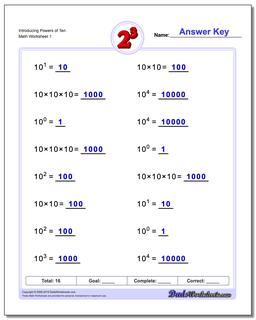Core Math Worksheets
Fraction Worksheets
Word Problems
Algebra and Trigonometry
Other Worksheets
Place Value
Percentages
Rounding Numbers
Ordering Numbers
Standard, Expanded, Word Form
Mean Median Mode Range
Ratio Worksheets
Probability Worksheets
Roman Numerals
Factorization, GCD, LCM
Prime and Composite Numbers
Pre-Algebra
Geometry Worksheets
Blank Clocks
Telling Analog Time
Analog Elapsed Time
Greater Than and Less Than
Money
Arithmetic Sequences
Geometric Sequences
Venn Diagram
Graph Worksheets
Measurement & Conversions
Patterns and Puzzles
Color by Number
Holiday & Seasonal
Early Learning
Printables
Calculators
Exponents Worksheets
This page contains links to free math worksheets for Exponents problems. Click one of the buttons below to see all of the worksheets in each set. You can also use the 'Worksheets' menu on the side of this page to find worksheets on other math topics.
Simple Exponents and Powers of Ten
20 Exponents Worksheets
Practice exponents worksheets introducing exponent syntax, calculation of simple exponents, powers of ten and scientific notation. The first of these exponents worksheets include hints and will build familiarity with many common exponential terms.
Simple Exponents and Powers of TenAddition with Exponents
12 Exponents Worksheets
Adding exponents worksheets, including simple problems where exponents are combined and order of operations rules (PEMDAS) must be observed.
Addition with ExponentsMixed Addition And Subtraction with Exponents
12 Exponents Worksheets
Worksheet practice mixing exponents with addition and subtraction operations. This is great practice for helping learn order of operations with exponents.
Mixed Addition And Subtraction with ExponentsMultiplication with Exponents
12 Exponents Worksheets
Practice exponents worksheets mixing exponents with simple multiplication. Again, these are fantastic exercises for enhancing student comprehension of basic order of operations concepts where exponents are involved.
Multiplication with ExponentsPowers of Ten and Scientific Notation
40 Exponents Worksheets
Exponents worksheets for computing powers of ten and scientific notation, including positive exponents and negative exponents.
Powers of Ten and Scientific NotationExponents Worksheets
After learning multiplication, exponents are an important part of understanding fundamental numeric nomenclature and order of operations. The exponents worksheets in this section provide practice that reinforces the properties of exponents, including the basic procedures for adding exponents, subtracting exponents, dividing exponents and multiplying exponents. Exponents are also a critical part of understanding scientific notation, and one of the sets of exponents worksheets in this section focuses exclusively on powers of ten and exponents with base 10 to reinforce these concepts.
Exponent Rules
There are a number of simple exponent rules that make solving the problems on these exponents worksheets easier.
The value of any term with an exponent of zero is always equal to one.
The value of any term with an exponent of one is always equal to the base.
The value of any term with a negative exponent is the reciprocal of the same term with a positive exponent instead.
Multiplying Exponents
When multiplying two exponents with the same base, the result is the same as a term with base and an new exponent created by adding the two exponents in the terms of the problem.
Dividing Exponents
Similarly, for dividing exponents with the same base, the result is the same as a term with base and an new exponent created by subtracting the two numerator's exponent from the denominator's exponent.

